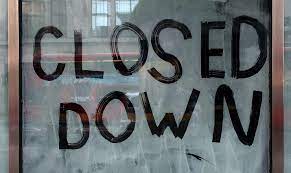IFAC accelerates engagement on anti-corruption and anti-money...
As evolving threats such as climate change, artificial intelligence, and geopolitical conflicts put increasing...
READ MORE
More small businesses are at risk as the gross domestic product figures continue to fall and a recession seems inevitable, said UK business groups.

And without government intervention, the economy will shrink further as more businesses close their doors.
The Federation of Small Businesses said rather than raising taxes, the government should be looking at measures such as keeping the National Insurance down, reducing pre-profit taxes and tackling late payments.
The UK GDP fell 0.2 per cent in the third quarter and Federation of Small Businesses (FSB) national chair Martin McTague said the confirmation of a shrinking economy is dreadful news for small businesses that have been facing increasing recessionary pressures for months now.
“Lower levels of reserves and resources mean they are more vulnerable to downturns, and at a time when confidence is deteriorating in both consumers and businesses, the outlook for the UK economy is now very bleak indeed,” he said.
“The fall in GDP is one headline figure made up of countless bits of disappointing news for small businesses across the country — a new venue or premises they couldn’t open, a contract which ended unexpectedly, a staff member they had to let go. Taken together, the impact on the economy is huge, and the Government must demonstrate that it has grasped the scale of the issue.
“Coming out of pandemic-era lockdowns, this was supposed to be the period when the economic recovery would start to motor, with the small business community leading the way. Following the global financial crisis, nine out of 10 people moving back into employment did so through working for a small business or setting themselves up as one by starting their self-employed career.”
Mr McTague said over 2020–21 nearly half a million small businesses had already closed the latest figures point to even more shutting.
“Fewer small businesses and start-ups means lower growth, lower employment, and lost tax revenues for the Government — a vicious circle of decline that must be averted, rather than managed,” he said.
“The Government next week at its Autumn Statement must not just balance the books — it has to have a clear set of measures that will help boost prosperity, growth and jobs. Without it, in a year’s time we will be back here again, with an even smaller economy, looking once again for spending cuts and tax rises to balance a spreadsheet total.
“The Government should be urgently looking at reforming and reducing pre-profit taxes such as business rates, as promised in the 2019 manifesto, but not delivered, and keeping National Insurance down; at tackling late payments which are increasingly making our economy less efficient, and which are constraining growth and productivity; and avoiding measures that will constrain entrepreneurial activity and growth, such as hikes on dividends, entrepreneurs’ relief, pensions, capital gains, or creating a new online sales tax.”
According to the latest FSB Small Business Index, business confidence was at its lowest since lockdowns with more than two-thirds of small firms saying revenues stagnated or fell over the quarter, while nine in 10 said their costs are higher than a year ago with two in five saying they’ve seen a significant increase.
“One in five microbusinesses with under 10 employees has less than a month’s worth of cash reserves, while the same is true for one in nine businesses employing between 10 and 49 employees, showing how thin the cash cushion is for thousands of small firms, and how perilous the situation is for them,” Mr McTague said.
“Without growth measures, next Thursday’s Autumn Statement could be about balancing the Government’s books on the backs of small businesses — an approach that will simply not work, with so many already teetering on the edge.
“The Chancellor and Prime Minister must include measures to kickstart the economy, and get it growing again, to stem the loss of small businesses, and give them an operating environment that will allow them to get through a tough winter, and then flourish in the spring.”
David Bharier, head of research at the British Chambers of Commerce, said the latest GDP figures showed a decline across all 13 manufacturing sectors tracked by the Office of National Statistics with production output overall shrinking by 1.5 per cent.
“Services as a whole have seen no growth in the quarter,” he said.
“Our research clearly shows that business confidence has fallen significantly in recent months. Inflation, driven by energy costs and supply chain disruption, is by far and away the top factor of concern, wiping out margins for many SMEs.
“With the Bank of England now forecasting a two-year recession, monetary and fiscal policy need to align to prevent stagflation.
“The Chancellor’s Autumn Statement must reassure the financial markets after the recent self-inflicted turmoil. But businesses need to see a long-term economic plan that invests in people, skills, and infrastructure and radically improves our trading relationships with key markets, not least across Europe.”